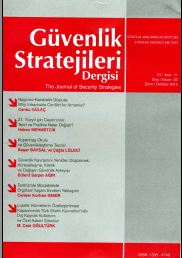Kopenhag Okulu ve Güvenlikleştirme Teorisi
Copenhagen School and Securitization Theory
Author(s): Başar Baysal, Çağla LÜLECİSubject(s): Security and defense, Military policy
Published by: Atatürk Stratejik Araştırmalar Enstitüsü
Keywords: Security Studies; Copenhagen School; Securitization Theory; Security Sectors; Regional Security Complex Theory
Summary/Abstract: The Copenhagen School has made major contributions to the changing conception of security in the post-Cold War era. Turkish literature on security lacks studies that specifically analyze securitization theory of the Copenhagen School, despite its wide application in the field of international relations and political science. This study aims to contribute to the Turkish literature on securitization theory through a comprehensive and systematic review of the basic and critical literature on the issue. To this end, this study first analyzes the debates on definition of security by traditionalist accounts and new approaches. Second, the study gives an account on regional security complex theory and sectoral security approach of the Copenhagen School. Third, it makes a detailed analysis of securitization theory by answering the questions “How an issue is securitized?”, “What are the units of securitization?”, and “What is the normative standing of Copenhagen School?” Finally, the study presents the current debates on the Copenhagen School securitization theory including under-analyzed audience and context and over-emphasized speech-act. Analyzing the concepts and approaches developed by the Copenhagen School, it appears that securitization theory dissociates itself from traditional approaches by adopting a constructivist approach to security, and from other critical approaches by regarding security as a negative concept and taking state as the basic (but not only) object of security. This study concludes that securitization theory has a significant place among the constructivist approaches to security and it provides a useful framework to analyze current international security issues.
Journal: Güvenlik Stratejileri Dergisi
- Issue Year: 11/2015
- Issue No: 22
- Page Range: 61-95
- Page Count: 35
- Language: Turkish

